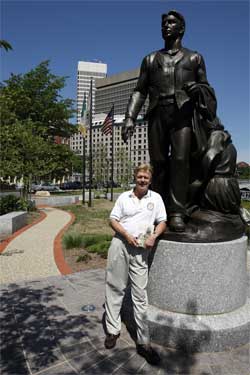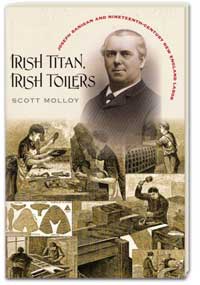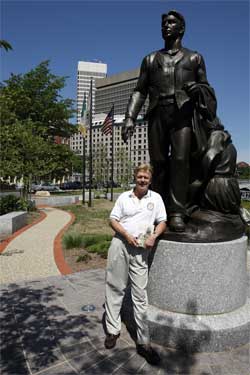 Irish Titan, Irish Toilers tells story of child laborer who became wealthy industrialist
Irish Titan, Irish Toilers tells story of child laborer who became wealthy industrialist
KINGSTON, R.I. – July 29, 2008 – Escaping starvation and death in Ireland, Joseph Banigan came to Rhode Island only to experience brutal poverty, child labor and vicious discrimination in the United States.
Scott Molloy, professor of labor and industrial relations at the University of Rhode Island’s Schmidt Labor Research Center, theorizes that such horrors haunted Banigan throughout his life and may have been the reasons for his ascension to the heights of American industry and wealth.
In his new book, Irish Titan, Irish Toilers, Joseph Banigan and 19th Century New England Labor, the West Kingston resident provides a detailed look at Banigan, his times, his rise to president of the U.S. Rubber Co., his battles with organized labor and his leading philanthropy.
The 308-page book, published by University of New Hampshire Press, completes Molloy’s 10 years of research on Banigan, who turned his Woonsocket Rubber Co. into the leading rubber shoe manufacturer of its time. From the University of Rhode Island library to Ireland’s County Monaghan where Banigan was born, Molloy chased every news clip, trade reference and family story to round out the saga of one of this country’s most innovative manufacturers and businessmen. 
“These are the books that are generally never written because the source material is so scarce,” said Molloy, a former city bus driver and union chief. “But I stick with these subjects because they are the stories of the hardships and struggles of the working class.
A 1970 graduate of Rhode Island College, Molloy drove a bus while pursuing his Ph.D. at Providence College, which he earned in 1991.
“The question that kept eating at me as I researched Banigan was ‘How did this man, who should have been mired in child labor and poverty, become a national business leader?’” Molloy said.
Molloy said Banigan came to the United States in 1847 when he was about 8 years old, and completed only one year of school here. “At 9 years old, he became a full-time worker at the American Screw Co. in Providence’s Fifth Ward,” Molloy said.
By around 1860, Banigan finished an apprenticeship in the jewelry trade and served a short time at the Providence Rubber Co. where he met John Holt, his future business partner and father-in-law. He took the lessons learned in the jewelry industry and at the rubber company and became a partner with John Haskins in making rubber plugs for bottles and containers in the Boston area.
Despite “the most despicable and hateful language used against the Irish and Catholics,” Molloy said by the time Banigan was 25, he was more American than Irish, and became an advocate for Irish integration in mainstream New England life even though the Irish found security in their clannish neighborhoods.
On June 27, 1867, Banigan and his partners incorporated the Woonsocket Rubber Co. on Social and Clinton Streets in Woonsocket. In 1889, after establishing several operations in Millville, Mass., Banigan opened the Alice Mill for the Woonsocket Rubber Co., which was named after his mother. Molloy said it was the premier shoe production facility in the world. Its success almost scuttled the formation of the U.S. Rubber Co. cartel in 1892 because none of the companies had a comparable facility.
While building his rubber empire, Banigan did not forget his fellow Irish countrymen, hiring them to work in his factories and treating them with a dignity they had never experienced.
In his book, Molloy states that during the mass arrival of Famine refugees, the Irish population in Rhode Island swelled to almost 16,000 in 1855, constituting about one-tenth of the state’s population of 150,000 and more than a quarter of the residents of Providence. For a time, the Irish were the dominant immigrant group in Woonsocket.
Sensitive to the immigrant experience in late 19th century America, Banigan was familiar with the plight of Woonsocket’s population, which Molloy said was 75 percent foreign born. “There was no such thing as legal immigration before World War I. So when I hear people, especially the Irish-Americans say, ‘My ancestors came here with papers,’ I scold them. They didn’t even have toilet paper.”
Banigan took it upon himself to help the immigrant populations, making huge donations to orphanages, the Lying Inn Hospital (now Women & Infants Hospital), the Society for the Prevention of Cruelty to Children, the Home for the Aged, St. Maria’s Home for Working Girls and even Brown University, which Molloy said at times crackled with anti-Catholic rhetoric.
A devout Catholic himself, he was a major supporter of St. Charles Church in Woonsocket and the construction of Saints Peter and Paul Cathedral in Providence, the seat of the Roman Catholic Diocese in Rhode Island.
“He is the biggest Irish-Catholic philanthropist in the history of Rhode Island,” Molloy said.
Molloy’s book is available in local bookstores, Amazon.com, Booktopia.com, Overstock.com and University Press of New England at http://www.upne.com/1-58465-690-5.html
There will be a book signing party for South County residents at Pancho O’Malley’s, 140 Point Judith Road, Narragansett, Tuesday, Aug. 12, 6:30 to 8:30 p.m. The book will be available at a 25 percent discount, $19.99.
Pictured above
Scott Molloy poses at the Rhode Island Irish Famine Memorial in Providence with his new book. Irish Titan, Irish Toilers, Joseph Banigan and 19th Century New England Labor. URI Communications and Marketing Photo by Joe Giblin

